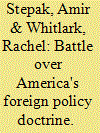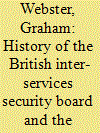| Srl | Item |
| 1 |
ID:
147100


|
|
|
|
|
| Summary/Abstract |
The United States has the best military in the world today, by far. U.S. forces have few, if any, weaknesses, and in many areas—from naval warfare to precision-strike capabilities, to airpower, to intelligence and reconnaissance, to special operations—they play in a totally different league from the militaries of other countries. Nor is this situation likely to change anytime soon, as U.S. defense spending [2] is almost three times as large as that of the United States’ closest competitor, China [3], and accounts for about one-third of all global military expenditures—with another third coming from U.S. allies and partners.
|
|
|
|
|
|
|
|
|
|
|
|
|
|
|
|
| 2 |
ID:
115189


|
|
|
|
|
| Publication |
2012.
|
| Summary/Abstract |
One balmy Washington evening in June 2011, President Barack Obama was set to deliver a highly anticipated address declaring the drawdown of US forces in Afghanistan. What he delivered, however, was much more. In his speech, Obama laid out a clear foreign-policy doctrine, touching on the role the United States should play in world affairs, the values it holds dear, and the principles guiding its use of force and diplomatic efforts. Rejecting the divergent paths of isolationism and expansionism, Obama called for 'a more centered course':
|
|
|
|
|
|
|
|
|
|
|
|
|
|
|
|
| 3 |
ID:
133419


|
|
|
|
|
| Publication |
2014.
|
| Summary/Abstract |
During the Second World War there was an increasingly developed system for controlling the code-names used for operations where different Allied forces were involved. This paper follows the development of this system - based on the British Inter-Services Security Board - that spread to overseas theatres on the British side and to American forces world-wide. The selection of code-names was not without controversy; with Winston Churchill getting personally involved and his intervention is highlighted. A critique of the system is attempted, although the final judge is ultimately the success of the security of the activities disguised by the code-names.
|
|
|
|
|
|
|
|
|
|
|
|
|
|
|
|